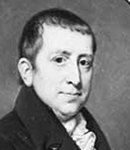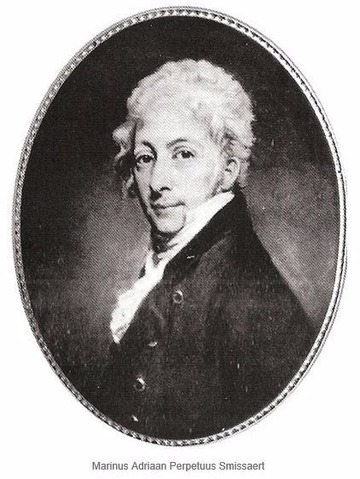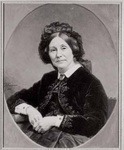Nimetz-Feder-Flash BIG Family Tree » Claude Crommelin (1836-1861)
Personal data Claude Crommelin
Source 1- He was born on February 12, 1836 in Amsterdam, North Holland, Netherlands.
- Resident in the year 1836: Amsterdam, Noord-Holland, Netherlands, Amsterdam, Noord-Holland, Netherlands.
- He died on November 7, 1861 in Utrecht, Utrecht, Netherlands, he was 25 years old.
- A child of Gulian Cornelis Crommelin and Louise Maria Jacoba Smissaert
Household of Claude Crommelin
Timeline Claude Crommelin
This functionality is only available in Javascript supporting browsers.
Click on the names for more info.
Symbols used:  grandparents
grandparents
 parents
parents
 brothers/sisters
brothers/sisters
 children
children
 grandparents
grandparents
 parents
parents
 brothers/sisters
brothers/sisters
 children
children
Sources
- Spithost-Douma Web Site, Petra Spithost, Claude Crommelin, May 29, 2017
התווסף באמצעות Smart Match
אילן יוחסין MyHeritage
אתר משפחתי: Spithost-Douma Web Site
אילן יוחסין: 229352611-2
Matches in other publications
This person also appears in the publication:Historical events
Birthday February 12, 1836
- The temperature on February 12, 1836 was about 7.0 °C. Wind direction mainly west. Weather type: half bewolkt regen sneeuw. Special wheather fenomena: storm(achtig). Source: KNMI
- This page is only available in Dutch.De Republiek der Verenigde Nederlanden werd in 1794-1795 door de Fransen veroverd onder leiding van bevelhebber Charles Pichegru (geholpen door de Nederlander Herman Willem Daendels); de verovering werd vergemakkelijkt door het dichtvriezen van de Waterlinie; Willem V moest op 18 januari 1795 uitwijken naar Engeland (en van daaruit in 1801 naar Duitsland); de patriotten namen de macht over van de aristocratische regenten en proclameerden de Bataafsche Republiek; op 16 mei 1795 werd het Haags Verdrag gesloten, waarmee ons land een vazalstaat werd van Frankrijk; in 3.1796 kwam er een Nationale Vergadering; in 1798 pleegde Daendels een staatsgreep, die de unitarissen aan de macht bracht; er kwam een nieuwe grondwet, die een Vertegenwoordigend Lichaam (met een Eerste en Tweede Kamer) instelde en als regering een Directoire; in 1799 sloeg Daendels bij Castricum een Brits-Russische invasie af; in 1801 kwam er een nieuwe grondwet; bij de Vrede van Amiens (1802) kreeg ons land van Engeland zijn koloniën terug (behalve Ceylon); na de grondwetswijziging van 1805 kwam er een raadpensionaris als eenhoofdig gezag, namelijk Rutger Jan Schimmelpenninck (van 31 oktober 1761 tot 25 maart 1825).
- In the year 1836: Source: Wikipedia
- The Netherlands had about 2.9 million citizens.
- February 25 » Samuel Colt is granted a United States patent for his revolver firearm.
- April 20 » U.S. Congress passes an act creating the Wisconsin Territory.
- May 4 » Formation of Ancient Order of Hibernians
- June 15 » Arkansas is admitted as the 25th U.S. state.
- August 17 » British parliament accepts registration of births, marriages and deaths
- October 22 » Sam Houston is inaugurated as the first President of the Republic of Texas.
Day of death November 7, 1861
- The temperature on November 7, 1861 was about 7.5 °C. There was 1 mm of rain. The air pressure was 2 kgf/m2 and came mainly from the west-southwest. The airpressure was 75 cm mercury. The atmospheric humidity was 85%. Source: KNMI
- Koning Willem III (Huis van Oranje-Nassau) was from 1849 till 1890 sovereign of the Netherlands (also known as Koninkrijk der Nederlanden)
- From February 23, 1860 till March 14, 1861 the Netherlands had a cabinet Van Hall - Van Heemstra with the prime ministers Mr. F.A. baron Van Hall (conservatief-liberaal) and Mr. S. baron Van Heemstra (liberaal).
- From March 14, 1861 till January 31, 1862 the Netherlands had a cabinet Van Zuijlen van Nijevelt - Loudon with the prime ministers Mr. J.P.P. baron Van Zuijlen van Nijevelt (conservatief-liberaal) and Mr. J. Loudon (liberaal).
- In the year 1861: Source: Wikipedia
- The Netherlands had about 3.6 million citizens.
- April 13 » American Civil War: Fort Sumter surrenders to Confederate forces.
- May 6 » American Civil War: Arkansas secedes from the Union.
- May 13 » Pakistan's (then a part of British India) first railway line opens, from Karachi to Kotri.
- June 3 » American Civil War: Battle of Philippi (also called the Philippi Races): Union forces rout Confederate troops in Barbour County, Virginia, now West Virginia.
- August 5 » American Civil War: In order to help pay for the war effort, the United States government levies the first income tax as part of the Revenue Act of 1861 (3% of all incomes over US$800; rescinded in 1872).
- December 26 » American Civil War: The Trent Affair: Confederate diplomatic envoys James Murray Mason and John Slidell are freed by the United States government, thus heading off a possible war between the United States and the United Kingdom.
Same birth/death day
- 1819 » William Wetmore Story, American sculptor, architect, poet and editor
- 1824 » Dayananda Saraswati, Indian monk and philosopher, founded Arya Samaj († 1883)
- 1828 » George Meredith, English novelist and poet († 1909)
- 1837 » Thomas Moran, British-American painter and printmaker of the Hudson River School († 1926)
- 1857 » Bobby Peel, English cricketer and coach († 1943)
- 1857 » Eugène Atget, French photographer († 1927)
- 1837 » Elijah Parish Lovejoy, American minister and journalist (b. 1809)
- 1862 » Bahadur Shah II, Mughal emperor (b. 1775)
- 1872 » Alfred Clebsch, German mathematician and academic (b. 1833)
- 1881 » John MacHale, Irish archbishop (b. 1791)
- 1906 » Heinrich Seidel, German engineer and poet (b. 1842)
- 1907 » Jesús García, Mexican railroad brakeman (b. 1881)
About the surname Crommelin
- View the information that Genealogie Online has about the surname Crommelin.
- Check the information Open Archives has about Crommelin.
- Check the Wie (onder)zoekt wie? register to see who is (re)searching Crommelin.
The Nimetz-Feder-Flash BIG Family Tree publication was prepared by Hadar Nimitz (Nimetz Niemiec).
When copying data from this family tree, please include a reference to the origin:
Hadar Nimitz (Nimetz Niemiec), "Nimetz-Feder-Flash BIG Family Tree", database, Genealogy Online (https://www.genealogieonline.nl/nimetz-feder-flash-big-family-tree/I501632.php : accessed April 30, 2025), "Claude Crommelin (1836-1861)".
Hadar Nimitz (Nimetz Niemiec), "Nimetz-Feder-Flash BIG Family Tree", database, Genealogy Online (https://www.genealogieonline.nl/nimetz-feder-flash-big-family-tree/I501632.php : accessed April 30, 2025), "Claude Crommelin (1836-1861)".




